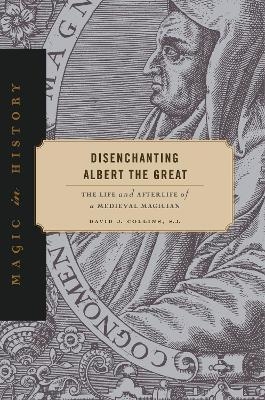
Disenchanting Albert the Great
The Life and Afterlife of a Medieval Magician
Seiten
2024
Pennsylvania State University Press (Verlag)
978-0-271-09744-2 (ISBN)
Pennsylvania State University Press (Verlag)
978-0-271-09744-2 (ISBN)
- Lieferbar (Termin unbekannt)
- Versandkostenfrei
- Auch auf Rechnung
- Artikel merken
Albert the Great (1200–1280) was a prominent Dominican friar, a leading philosopher, and the teacher of Thomas Aquinas. He also endorsed the use of magic. Controversial though that stance would have been, Albert was never punished or repudiated for what he wrote. Albert’s reception followed instead a markedly different course, leading ultimately to his canonization by the Catholic Church in 1931. But his thoughts about magic have been debated for centuries. Disenchanting Albert the Great takes Albert’s contested reputation as a case study for the long and complex history surrounding the concept of magic and magic’s relationship to science and religion.
Over the centuries, Albert was celebrated for his magic, or it was explained away—but he was never condemned. In the fifteenth century, members of learned circles first attempted to distance Albert from magic, with the goal of exonerating him of superstition, irrationality, and immorality. Disenchanting Albert the Great discusses the philosopher’s own understanding of magic; an early, adulatory phase of his reputation as a magician; and the three primary strategies used to exonerate Albert over the centuries.
In the end, Disenchanting Albert the Great tells the story of a thirteenth-century scholar who worked to disenchant the natural world with his ideas about magic but who himself would not be disenchanted until the modern era. This accessible and insightful history will appeal to those interested in Albert the Great, Catholic Church history, the history of magic, and Western understandings of the natural and the rational over time.
Over the centuries, Albert was celebrated for his magic, or it was explained away—but he was never condemned. In the fifteenth century, members of learned circles first attempted to distance Albert from magic, with the goal of exonerating him of superstition, irrationality, and immorality. Disenchanting Albert the Great discusses the philosopher’s own understanding of magic; an early, adulatory phase of his reputation as a magician; and the three primary strategies used to exonerate Albert over the centuries.
In the end, Disenchanting Albert the Great tells the story of a thirteenth-century scholar who worked to disenchant the natural world with his ideas about magic but who himself would not be disenchanted until the modern era. This accessible and insightful history will appeal to those interested in Albert the Great, Catholic Church history, the history of magic, and Western understandings of the natural and the rational over time.
David J. Collins, S.J., is Associate Professor of History at Georgetown University. He is the editor of The Sacred and the Sinister: Studies in Medieval Religion and Magic, also published by Penn State University Press.
| Erscheinungsdatum | 28.08.2024 |
|---|---|
| Reihe/Serie | Magic in History |
| Zusatzinfo | 7 Halftones, black and white |
| Verlagsort | University Park |
| Sprache | englisch |
| Maße | 156 x 235 mm |
| Gewicht | 522 g |
| Themenwelt | Geschichte ► Allgemeine Geschichte ► Mittelalter |
| Geschichte ► Allgemeine Geschichte ► Neuzeit (bis 1918) | |
| Geisteswissenschaften ► Geschichte ► Regional- / Ländergeschichte | |
| Geisteswissenschaften ► Religion / Theologie ► Weitere Religionen | |
| ISBN-10 | 0-271-09744-2 / 0271097442 |
| ISBN-13 | 978-0-271-09744-2 / 9780271097442 |
| Zustand | Neuware |
| Haben Sie eine Frage zum Produkt? |
Mehr entdecken
aus dem Bereich
aus dem Bereich
eine neue Geschichte des Mittelalters
Buch | Hardcover (2023)
C.H.Beck (Verlag)
CHF 53,20


